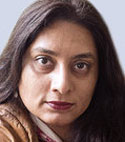Sufism Won't Solve Pakistan's Problems

By Bina Shah
April 20, 2015
Religiously motivated violence has steadily haunted Pakistan over the last 10 years, with the rise of militants and extremists who believe it's their holy duty to wage war on non-Muslims. The latest horrific episode: The Lahore church suicide bombing on March 15 which killed 16 Christians; two Muslim bystanders were also lynched and burned to death by an angry mob in the aftermath of the bombing.
As the author of the novel "A Season For Martyrs", which examines the fusion of Sufi tradition with the power structures of Sindh, I have watched with caution as western think-tanks have thrown up Sufism, the mystical branch of Islam with an emphasis on tolerance, peace, and love, as a means of combating this ideology of violence. Yet, I strongly believe that this is a misguided policy; using Sufism to counter religious terrorism is not the solution to Pakistan's problems.
Since 9/11, Pakistan has witnessed the weakening of state institutions, the confusion of political leadership, the uncertainty of whether or not to continue to nurture or disown the state's "strategic assets", that is, religious militants it has sponsored - and the relentless attacks by the Taliban and other militants against civilian, military, police, and minority targets.
Secularism as Solution?
Many Pakistani liberals posit secularism as the solution: They theorise, or fantasise, that going back in time to erase the dictator General Zia-ul Haq's Deobandi imprint on Pakistani society - in other words, to eliminate his Islamisation project from both the statute books and the annals of history - will ease Pakistan's pain and bring this divided country back together again.
On the other hand, western think-tanks, ever concerned with the rise of militancy in Pakistan and its ramifications for western interests, decided that Sufism could be a means of countering hardline radicalism in the Muslim world.
A 2007 RAND report urged western governments to "harness" Sufism; similar reports emerged from the Heritage Foundation, the Libforall Foundation and the Nixon Center, supporting the idea that Sufism, with its "politically moderating" effect, could supplant Salafism, whose local expression in Pakistan is the Deobandi movement.
Muslim and other scholars hit back at this plan, calling it misguided. The peaceful Sufi/violent Salafi dichotomy, they argued, did not stand up to scrutiny; Sufism could be used as much to advocate violence as Salafism.
In Pakistan, even Barelvis, a moderate sect influenced by Sufism and opposed to Deobandism, have enacted or supported violence. The murder of Punjab Governor Salmaan Taseer was committed by Mumtaz Qadri, a Barelvi, in 2011; Barelvi clerics have rallied for his cause ever since.
Many Pakistani liberals posit secularism as the solution: They theorise, or fantasise, that going back in time to erase the dictator General Zia-ul Haq's Deobandi imprint on Pakistani society ... will ease Pakistan's pain and bring this divided country back together again.
Still, this didn't stop the Pakistani government from trying out the formula: It formed a Sufi Advisory Council in 2009 to try and spiritually convince radicals to lay down their arms.
Since then, shrines and Sufi leaders have continued to be attacked all over Pakistan: the Baba Farid shrine and Sakhi Sarwar shrine in Punjab, Lahore's most famous Data Darbar shrine, the shrine of Sheikh Taqi Baba in Balochistan; and the assassination of the Sufi leader Faqir Jamshed in Dera Ismail Khan, in northwest Pakistan.
Complete Reversal
The work of Farzana Shaikh, a Chatham House fellow and author of "Making Sense of Pakistan", represents a complete reversal from the discourse taking place about Pakistan's problems with extremism among its liberal intelligentsia: That religious extremism has come about because of the religious right wing's stubborn certainty that being a Pakistani equates to being a conservative Sunni Muslim, and that violence is a way of eliminating from the fabric of Pakistani society those people who don't fit that definition.
Yet, according to Shaikh, it's precisely Pakistan's uncertainty, not its certainty, about what it means to be Pakistani that has led the country to this critical point of desperate soul-searching amid one extremist-backed attack after another.
Until the nation engages critically with Islam, trying to pin down whether or not a Muslim country's raison d'etre is to provide a homeland for Muslims or to actually "defend Islam" - with all the troubling implications of that motivation - Pakistani will continue to flounder.
Shaikh calls the enterprise to recast Sufism as the counter to violent extremism terribly risky.
"The geopolitical context has changed; the competing narratives of Islam have all become more increasingly violent."
Bringing Sufism - or the Pakistani state's co-opted version of Sufism - into the mix has the potential to backfire, tearing the country further apart rather than healing its divisions.
And what effect would these political machinations have on the ordinary worshipper at a shrine, women and men who seek solace and security through their supplications?
"They don't know anything about it," says Shaikh. "They just don't understand why their shrines are now being bombed."
Using Sufism as a tool in a game of ideologies will only result in more attacks of this nature. Far better to let the Sufi saints rest in blissful ignorance of what the state might make of their legacy.
Bina Shah is an award-winning Pakistani writer from Karachi. She is a contributing opinion writer for the International New York Times and writes a monthly column for Dawn, the biggest English-language newspaper in Pakistan.
Source: http://www.aljazeera.com/indepth/opinion/2015/04/sufism-won-solve-pakistan-problems-150415103737791.html




 Moderate Islamist here
Moderate Islamist here


0 comments:
Post a Comment